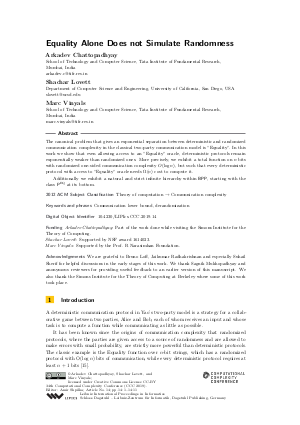Equality Alone Does not Simulate Randomness
Authors Arkadev Chattopadhyay, Shachar Lovett, Marc Vinyals
-
Part of:
Volume:
34th Computational Complexity Conference (CCC 2019)
Part of: Series: Leibniz International Proceedings in Informatics (LIPIcs)
Part of: Conference: Computational Complexity Conference (CCC) - License:
 Creative Commons Attribution 3.0 Unported license
Creative Commons Attribution 3.0 Unported license
- Publication Date: 2019-07-16
File

PDF
LIPIcs.CCC.2019.14.pdf
- Filesize: 465 kB
- 11 pages
Document Identifiers
Subject Classification
ACM Subject Classification
- Theory of computation → Communication complexity
Keywords
- Communication lower bound
- derandomization
Metrics
- Access Statistics
-
Total Accesses (updated on a weekly basis)
0PDF Downloads0Metadata Views
Abstract
The canonical problem that gives an exponential separation between deterministic and randomized communication complexity in the classical two-party communication model is "Equality". In this work we show that even allowing access to an "Equality" oracle, deterministic protocols remain exponentially weaker than randomized ones. More precisely, we exhibit a total function on n bits with randomized one-sided communication complexity O(log n), but such that every deterministic protocol with access to "Equality" oracle needs Omega(n) cost to compute it.
Additionally we exhibit a natural and strict infinite hierarchy within BPP, starting with the class P^{EQ} at its bottom.
Cite As Get BibTex
Arkadev Chattopadhyay, Shachar Lovett, and Marc Vinyals. Equality Alone Does not Simulate Randomness. In 34th Computational Complexity Conference (CCC 2019). Leibniz International Proceedings in Informatics (LIPIcs), Volume 137, pp. 14:1-14:11, Schloss Dagstuhl – Leibniz-Zentrum für Informatik (2019)
https://doi.org/10.4230/LIPIcs.CCC.2019.14
BibTex
@InProceedings{chattopadhyay_et_al:LIPIcs.CCC.2019.14,
author = {Chattopadhyay, Arkadev and Lovett, Shachar and Vinyals, Marc},
title = {{Equality Alone Does not Simulate Randomness}},
booktitle = {34th Computational Complexity Conference (CCC 2019)},
pages = {14:1--14:11},
series = {Leibniz International Proceedings in Informatics (LIPIcs)},
ISBN = {978-3-95977-116-0},
ISSN = {1868-8969},
year = {2019},
volume = {137},
editor = {Shpilka, Amir},
publisher = {Schloss Dagstuhl -- Leibniz-Zentrum f{\"u}r Informatik},
address = {Dagstuhl, Germany},
URL = {https://drops.dagstuhl.de/entities/document/10.4230/LIPIcs.CCC.2019.14},
URN = {urn:nbn:de:0030-drops-108368},
doi = {10.4230/LIPIcs.CCC.2019.14},
annote = {Keywords: Communication lower bound, derandomization}
}
Author Details
- School of Technology and Computer Science, Tata Institute of Fundamental Research, Mumbai, India
- Department of Computer Science and Engineering, University of California, San Diego, USA
Funding
- Chattopadhyay, Arkadev: Part of the work done while visiting the Simons Institute for the Theory of Computing.
- Lovett, Shachar: Supported by NSF award 1614023.
- Vinyals, Marc: Supported by the Prof. R Narasimhan Foundation.
Acknowledgements
We are grateful to Bruno Loff, Jaikumar Radhakrishnan and especially Suhail Sherif for helpful discussions in the early stages of this work. We thank Sagnik Mukhopadhyay and anonymous reviewers for providing useful feedback to an earlier version of this manuscript. We also thank the Simons Institute for the Theory of Computing at Berkeley where some of this work took place.
References
- Noga Alon, János Pach, Rom Pinchasi, Radoš Radoičić, and Micha Sharir. Crossing patterns of semi-algebraic sets. Journal of Combinatorial Theory, Series A, 111(2):310-326, 2005. URL: https://doi.org/10.1016/j.jcta.2004.12.008.
- Andris Ambainis, Kaspars Balodis, Aleksandrs Belovs, Troy Lee, Miklos Santha, and Juris Smotrovs. Separations in Query Complexity Based on Pointer Functions. Journal of the ACM, 64(5):32:1-32:24, 2017. Preliminary version in STOC '16. URL: https://doi.org/10.1145/3106234.
- László Babai, Péter Frankl, and János Simon. Complexity Classes in Communication Complexity Theory. In Proceedings of the 27th Annual Symposium on Foundations of Computer Science (FOCS '86), pages 337-347, October 1986. URL: https://doi.org/10.1109/SFCS.1986.15.
- Paul Beame, Noah Fleming, Russell Impagliazzo, Antonina Kolokolova, Denis Pankratov, Toniann Pitassi, and Robert Robere. Stabbing Planes. In Proceedings of the 9th Innovations in Theoretical Computer Science Conference (ITCS '18), volume 94 of Leibniz International Proceedings in Informatics (LIPIcs), pages 10:1-10:20, January 2018. URL: https://doi.org/10.4230/LIPIcs.ITCS.2018.10.
- María Luisa Bonet, Juan Luis Esteban, Nicola Galesi, and Jan Johannsen. On the Relative Complexity of Resolution Refinements and Cutting Planes Proof Systems. SIAM Journal on Computing, 30(5):1462-1484, 2000. Preliminary version in FOCS '98. URL: https://doi.org/10.1137/S0097539799352474.
- Susanna F. de Rezende, Jakob Nordström, and Marc Vinyals. How Limited Interaction Hinders Real Communication (and What It Means for Proof and Circuit Complexity). In Proceedings of the 57th Annual IEEE Symposium on Foundations of Computer Science (FOCS '16), pages 295-304, October 2016. URL: https://doi.org/10.1109/FOCS.2016.40.
- Mika Göös, Toniann Pitassi, and Thomas Watson. The Landscape of Communication Complexity Classes. Computational Complexity, 27(2):245-304, June 2018. Preliminary version in ICALP '16. URL: https://doi.org/10.1007/s00037-018-0166-6.
- Johan Håstad and Avi Wigderson. The Randomized Communication Complexity of Set Disjointness. Theory of Computing, 3(1):211-219, 2007. URL: https://doi.org/10.4086/toc.2007.v003a011.
- Bala Kalyanasundaram and Georg Schnitger. The Probabilistic Communication Complexity of Set Intersection. SIAM J. Discrete Math., 5(4):545-557, 1992. URL: https://doi.org/10.1137/0405044.
- Jan Krajíček. Interpolation by a Game. Mathematical Logic Quarterly, 44(4):450-458, 1998. URL: https://doi.org/10.1002/malq.19980440403.
-
Eyal Kushilevitz and Noam Nisan. Communication Complexity. Cambridge University Press, New York, NY, USA, 1997.

- Noam Nisan. CREW PRAMs and decision trees. SIAM Journal on Computing, 20(6):999-1007, December 1991. URL: https://doi.org/10.1137/0220062.
-
Noam Nisan. The communication complexity of threshold gates. In Proceedings of Combinatorics, Paul Erdős is Eighty, volume 1, pages 301-315, 1993.

- Periklis A. Papakonstantinou, Dominik Scheder, and Hao Song. Overlays and Limited Memory Communication. In Proceedings of the 29th IEEE Conference on Computational Complexity (CCC '14), pages 298-308, June 2014. URL: https://doi.org/10.1109/CCC.2014.37.
- Andrew Chi-Chih Yao. Some Complexity Questions Related to Distributive Computing (Preliminary Report). In Proceedings of the 11th Annual ACM Symposium on Theory of Computing (STOC '79), pages 209-213, April 1979. URL: https://doi.org/10.1145/800135.804414.
- Andrew Chi-Chih Yao. On the power of quantum fingerprinting. In Proceedings of the 35th Annual ACM Symposium on Theory of Computing (STOC '03), pages 77-81, June 2003. URL: https://doi.org/10.1145/780542.780554.
